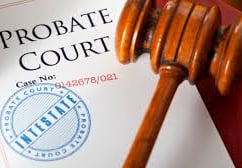General Probate Frequently Asked Questions
What is Probate?
Probate is the legal procedure in which an estate is settled, debts are paid, and assets are distributed to beneficiaries or heirs. Probate, which is overseen by the state’s probate court, involves first proving a will is valid (if there is one) then appointing someone who will administer the estate until it’s settled.
How is the probate process started?
Probate doesn’t begin automatically when someone passes away. When a will is identified, the executor named in the will can begin the probate process by filing a petition with the court to be officially acknowledged as the legal executor. The will and death certificate must also be filed.
If there is no will, an administration process is started instead. A petition must still be filed with the probate court to appoint an administrator for the estate.
Once this petition is filed, the court schedules a hearing to approve the appointed executive/administrator or listen to objections, if any. Notice of the hearing must be given to all beneficiaries and heirs of the decedent. Once an executive/administrator is approved, the probate case is opened with the court and the executive/administrator has the legal authority to act on behalf of the estate.
If the estate is very small, is probate still required?
Probate isn’t required for many estates but it depends on both the value of the estate and the type of property. If the property in the estate is designed to pass to beneficiaries outside of probate, probate isn’t necessary.
Many states also have a simplified probate process for small estates or allow probate to be skipped entirely. In California, probate is required if the value of the estate exceeds $150,000. In Texas, probate isn’t required for estates valued at $50,000 or less. Each state has its own rules on when probate can be skipped; sometimes there is a dollar cap on the estate value and rules on what type of assets affect the estate’s value for probate purposes. For example, Georgia doesn’t require full probate if there is no will, no debts are owed, and heirs agree on how property will be distributed.
For small estates, there are two probate shortcuts that may be available:
Claiming property with an affidavit. This may be an option if the value of all assets except real estate is below a certain amount.
Simplified court procedure. Many states have a simpler version of their probate that still involves the probate court but with less control over how the estate is settled.
How does the probate process work?
The probate process varies by state. Some states also have a simplified probate process for small or simple estates.
As a general rule, however, probate goes through a series of steps designed to validate the will, and ensure its instructions are followed, (if there is a will), pay debts of the estate, and distribute remaining assets to the intended beneficiaries and heirs.
Probate usually goes through the following steps:
If there is a will, it is submitted to the probate court.
A notice of Petition for Probate is published and a personal representative is appointed. The executor/administrator then files a formal petition with the court to probate the decedent’s estate.
Creditors may make claims against the estate for a period of time.
The personal representative identifies and gathers assets of the estate. These assets must be safeguarded and maintained.
When necessary, assets are liquidated to pay valid claims against the estate.
The personal representative files a final tax return.
A final petition is filed with the court to explain expenses, assets received and disbursed, how funds were used, and which debts were paid.
Once the petition is approved, assets are distributed to beneficiaries and heirs and the estate is settled.
When someone dies without a will, probate is a bit different. In this case, an administrator will be appointed by the court. The administrator performs the same tasks as a personal representative or executor to identify heirs, locate and value assets and debts, and distribute assets. Most states will make a spouse or domestic partner the administrator or adult children. The estate’s assets will be distributed according to the state’s intestate succession laws.
What happens during probate of an uncontested will?
The above process describing probate is the process when a will is uncontested. After the will is admitted to court, a hearing on the petition will be scheduled to give potential heirs and beneficiaries an opportunity to object. If no objections are received, the court appoints the personal representative. Depending on the state, a contest can still be filed until the estate is settled.
Where is probate handled?
Probate is handled by the probate court in the county and state in which the decedent lived as their primary residence at the time of death. Note that this refers to the decedent’s state of primary residence, not where they may have been living or vacationing when they passed away. Each state has its own name for its probate court. In many states, it’s simply called probate court but it may be called Surrogate’s Court (New York) or Superior Court, Probate Division (California).
Do I need a probate lawyer?
There is almost never a legal requirement to use a lawyer during the probate process, although probate can be complex and very formal. Some states like Florida do require an attorney for the probate process. A missed deadline or failing to follow proper procedures can result in an executor being liable for mistakes or debts, for example. As a general rule, a probate lawyer is recommended for estates that are large or complex enough to require probate.
IMPORTANT NOTE: Please be aware that the information on this page is delivered without warranty or guarantee of accuracy. It’s provided to help you learn more and formulate specific questions to discuss with your attorney and/or your Real Estate Professional and/or to help a personal representative, executor or executrix when executing their challenging responsibilities. By accessing this page, you acknowledge that it has been provided for information only and that you are hereby advised that any decisions regarding probate issues should be discussed with an attorney and/or a Real Estate Professional.




